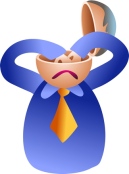 In essence, Dr. Allen Frances is the guy who wrote the book on mental illness. As editor of the 4th edition of the psychiatric reference book called the Diagnostic and Statistical Manual of Mental Disorders (universally known as the DSM-IV), he now makes this grim admission about what’s been called the “bible” of the psychiatric profession: “We made mistakes that had terrible consequences.” Continue reading
In essence, Dr. Allen Frances is the guy who wrote the book on mental illness. As editor of the 4th edition of the psychiatric reference book called the Diagnostic and Statistical Manual of Mental Disorders (universally known as the DSM-IV), he now makes this grim admission about what’s been called the “bible” of the psychiatric profession: “We made mistakes that had terrible consequences.” Continue reading
Tag Archives: Joseph Biederman
“Integrity in Science” – who’s paying the piper?
UPDATE: The Integrity in Science database is no longer posted on the CSPI website. See ProPublica’s “Dollars For Docs: How Industry Money Reaches Physicians“ site for comparable financial conflict of interest lists.
Looking for a luscious way to noodle away an hour this weekend? Check out the Center for Science in the Public Interest and their Integrity In Science conflict-of-interest project. But before you back away slowly for something more exciting like organizing the sock drawer, consider this: there is strong evidence that researchers’ financial ties to chemical, pharmaceutical, or tobacco manufacturers directly influence their published positions in supporting the benefit or downplaying the harm of the manufacturers’ product.
In other words, as a heart attack survivor whose doctor has prescribed a fistful of meds, I have no clue which of those drugs has been recommended based on flawed research or tainted journal papers that have essentially been bought and paid for by the drug company who made them. And, worse, neither do my doctors.
So to check who’s taking money from whom, you can now visit the Integrity in Science database and find out for yourself. Continue reading
JUST SAY NO to antipsychotic drugs for toddlers
 At 18 months, Kyle Warren started taking a daily antipsychotic drug on the orders of a pediatrician trying to quell the boy’s severe temper tantrums. The troubled toddler’s journey from one doctor to another, from one diagnosis to another (involving even more drugs for autism, bipolar disorder, hyperactivity, insomnia and oppositional defiant disorder) was shared recently in the New York Times. The boy’s daily pill regimen multiplied: the antipsychotic Risperdal, the antidepressant Prozac, two sleep drugs, and one for attention-deficit disorder.
At 18 months, Kyle Warren started taking a daily antipsychotic drug on the orders of a pediatrician trying to quell the boy’s severe temper tantrums. The troubled toddler’s journey from one doctor to another, from one diagnosis to another (involving even more drugs for autism, bipolar disorder, hyperactivity, insomnia and oppositional defiant disorder) was shared recently in the New York Times. The boy’s daily pill regimen multiplied: the antipsychotic Risperdal, the antidepressant Prozac, two sleep drugs, and one for attention-deficit disorder.
And all by the time he was three years old. Continue reading
